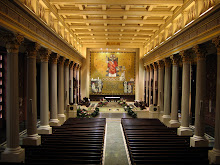A few weeks ago, I was asked and gladly was a part of our
first CREDO retreat in the northern part of the Archdiocese of Cincinnati. Held on the beautiful grounds of the Maria
Stein Retreat Center,
where I had often gone as a teen for retreats, we gathered over 80 young people
for four days of prayer and reflection, funny enough on the topic of prayer:
what is it? How does it happen? Styles of prayer, etc. We wanted to give the attendees not just
information about prayer, but opportunities to also ‘experience’ prayer, to
begin a life-long habit of prayer, to begin a life-long habit of journeying
with Christ to our homeland in heaven.
As we put together the retreat, there was something of a
science to prayer that we wanted to convey, for there certainly are ‘steps’
that one can take for growth in one’s prayer life. But so much of prayer, in fact the very
source of prayer, does not start with the individual who is praying, but is
actually a graced moment from God Himself, He is the author of the prayer of
the individual, in that great twist of faith that so often happens.
Because God is the both the source and the summit of our prayer
life, the routine of personal prayer can certainly help us ‘clue in’ to what
God is doing in our lives. But
ultimately, prayer is that deeper conversation between the heart of the
believer and God. So, while there is
certainly a ‘science’ to prayer, there is also an art to it as well, a certain
requirement for flair, for the unexpected.
This is where the challenge can really arise, especially for
those of us who live in the modern world.
So much of what we are formed in by this culture is to be in control, to
take charge and be a ‘self made man (or woman),’ as it were. In prayer, this is exactly the opposite. Instead, it is the call to ‘let go and let
God.’ YIKES! Because when He takes over, who knows just
how deep the rabbit hole really can go!
This is where the Catechism of the Catholic Church turns an
interesting phrase. For in discussing
prayer in Part IV, they certainly hit the section which we all experience at
some point in our lives: spiritual dryness, or as Saint
Paul so eloquently termed: the spirit is willing, but
the flesh is weak.
The Catechism terms this struggle ‘The Battle for Prayer,’
recognizing that ‘prayer is both a gift of grace and a determined response on
our part. (CCC 2725)’ While that initial definition seems to be
rather easy to embrace, it is that second half, the ‘determined response’ that
can lead to difficulties, especially when we bump into those physical and
spiritual limits that sometimes come our way and realize that to ‘pray always’
actually does take work!
In response to the dryness, the lack of faith that sometimes
arises in prayer, or simply the laziness that is easy to succumb to in prayer,
the Catechism calls us first to a filial trust: the trust that God, as Father,
hears our prayers and provides the gentle encouragement, not always in the way
we want, but in the way we need.
Often, when we experience these frustrations and dry-spells,
we throw in the towel and give up with a thought that our prayers are not
efficacious. However, it is precisely in
these moments that our prayer takes on a deeper level, because we do not pray
so that we see the results, but rather so that we might be drawn deeper to God,
and that is something that only He can do in us.
Blessed Mother Theresa of Calcutta experienced years of
darkness and dryness in her prayer, which strangely enough became part of the
secret to her great success. Shall we
not also expect the same?





